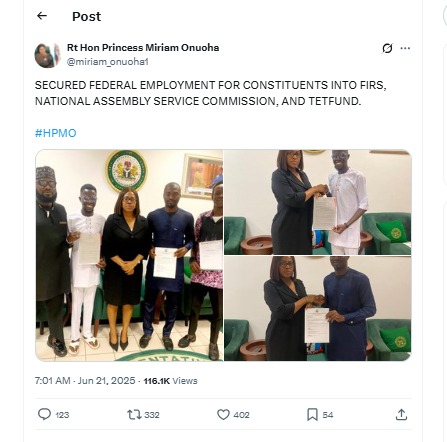Student Village Academy › Forums › VILLAGE POLITICS AND CURRENT AFFAIRS › Local Politics › Nigerian Lawmaker Miriam Onuoha Admits to Facilitating Federal Job Slots for Constituents
- This topic is empty.
-
AuthorPosts
-
-
June 23, 2025 at 12:58 PM #80145
 Shekinah BramaModerator
Shekinah BramaModeratorMiriam Onuoha, a member of Nigeria’s House of Representatives, has openly acknowledged that she secured job placements for her constituents at three federal government agencies — the Federal Inland Revenue Service (FIRS), the National Assembly Service Commission (NASC), and the Tertiary Education Trust Fund (TETFund).

In a post shared via her official X (formerly Twitter) account on Saturday, Onuoha listed the appointments as part of her achievements in office. The lawmaker, who currently chairs the House Committee on TETFund and Other Services, exercises oversight on one of the same agencies where she reportedly facilitated employment.
Her public admission has raised serious legal and ethical concerns.
Federal Law vs. Political Patronage
Nigeria’s constitution outlines a clear framework for recruitment into federal agencies, emphasizing transparency, merit, and equitable representation. Section 153(1)(d) of the 1999 Constitution designates the Federal Civil Service Commission (FCSC) as the only body authorized to appoint individuals into the federal civil service. In addition, Section 14(3) upholds the “federal character” principle, mandating inclusive representation from all parts of the country.
Agencies like the FIRS and NASC fall under these regulations, which require vacancies to be publicly advertised and filled through open, competitive processes. Similarly, the TETFund Act of 2011 mandates adherence to public service standards, even though the agency is not a core civil service body.
By law, public officials are forbidden from using their office to offer undue advantage. The Code of Conduct Bureau and Tribunal Act and the Corrupt Practices and Other Related Offences Act both prohibit the use of official position for personal or political gain. Section 19 of the latter makes it a criminal offence for public officers to confer “any corrupt or unfair advantage” through their roles.
Despite these legal provisions, Onuoha’s statement did not clarify how many individuals she helped secure employment, nor whether proper procedures were followed. None of the agencies she named have issued any public response.
FIRS Says Its Hiring Process is Transparent
Earlier this year, the Federal Inland Revenue Service (FIRS) declared that its ongoing recruitment exercise was based strictly on merit. In an April statement signed by Collins Omokaro, Special Adviser on Communications to the FIRS Chairman, the agency maintained that it was “reshaping the future of FIRS” through transparent hiring processes overseen by internal leadership and staff representatives.
This commitment to fairness now stands in contrast to claims by lawmakers, including Onuoha, who allege they have influenced appointments at FIRS and other federal institutions.
A Pattern Among Lawmakers
Onuoha is not alone in making such claims. In March 2024, Senator Ken Eze of Ebonyi Central said he helped over 40 graduates from his constituency secure jobs in agencies such as the Nigeria Television Authority (NTA), National Broadcasting Commission (NBC), and the Advertising Regulatory Council of Nigeria (ARCON).
Similarly, Dominic Tarkighir, a federal lawmaker from Benue State, was linked to employment slots at the Federal Airports Authority of Nigeria (FAAN) — a day after the agency publicly denied any ongoing recruitment.
In another case, FIJ reported that Sagir Ibrahim Koki of Kano Municipal facilitated permanent employment for a constituent at the NASC.
Legal Responsibility vs. Political Culture
While many legislators argue that helping constituents gain federal employment is part of their representative duty, there is no legal mandate giving lawmakers the power to allocate job slots. Experts argue that such practices undermine meritocracy and fuel nepotism within Nigeria’s public sector.
Despite repeated denials from regulatory agencies and recruitment bodies, these incidents highlight a concerning pattern — where political influence continues to shape federal employment in ways that bypass legal standards.
As scrutiny around public sector recruitment grows, observers are calling for greater enforcement of civil service rules — and accountability for officials who violate them.
-
-
AuthorPosts
- You must be logged in to reply to this topic.

